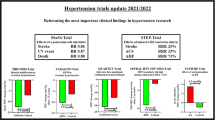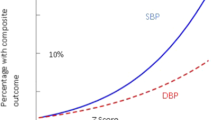Abstract
Antihypertensive therapy has been demonstrated to significantly reduce cardiovascular and noncardiovascular mortality in randomized controlled clinical trials. In the past, however, doubts have been raised on the safety of one class of blood pressure lowering drugs, namely the angiotensin II type 1 receptor antagonists (angiotensin receptor blockers [ARBs]), in terms of increased risk of myocardial infarction. Several comprehensive meta-analyses have definitely demonstrated no significant increased risk of myocardial infarction in patients treated with ARBs compared with placebo or any other active treatments. More recently, a partial meta-analysis has suggested a potential link between the use of this drug class and an increased risk of cancer. Although a further comprehensive network meta-analysis demonstrated the lack of any increased risk of cancer development or cancer mortality in patients treated with different antihypertensive drug classes, including ARBs, compared with placebo, this report has generated claims and uncertainties in the medical community and produced a vast echo in the lay press. The biological plausibility, the potential pathophysiological mechanisms, and the clinical evidence that rule out such hypotheses are discussed here. The present article, which represents a position paper of the Italian Society of Hypertension (SIIA), states that the benefits derived from the use of ARBs outweigh the potential risks, and that the use of these drugs should be maintained according to present indications.
Similar content being viewed by others
References
Corrao G, Zambon A, Parodi A, et al. Discontinuation of and changes in drug therapy for hypertension among newly-treated patients: a population-based study in Italy. J Hypertens 2008 Apr; 26(4): 819–24
Volpe M, Azizi M, Danser AH, et al. Twisting arms to angiotensin receptor blockers/antagonists: the turn of cancer. Eur Heart J 2011 Jan; 32(1): 19–22
Volpe M, Tocci G, Pagannone E. Fewer mega-trials and more clinically oriented studies in hypertension research? The case of blocking the renin-angiotensin-aldosterone system. J Am Soc Nephrol 2006 Apr; 17(4 Suppl. 2): S36–43
Mancia G, De Backer G, Dominiczak A, et al. 2007 ESH-ESC Practice Guidelines for the Management of Arterial Hypertension: ESH-ESC Task Force on the Management of Arterial Hypertension. J Hypertens 2007 Sep; 25(9): 1751–62
Verma S, Strauss M. Angiotensin receptor blockers and myocardial infarction. BMJ 2004 Nov 27; 329(7477): 1248–9
Volpe M, Tocci G, Sciarretta S, et al. Angiotensin II receptor blockers and myocardial infarction: an updated analysis of randomized clinical trials. J Hypertens 2009 May; 27(5): 941–6
Pfeffer MA, Swedberg K, Granger CB, et al. Effects of candesartan on mortality and morbidity in patients with chronic heart failure: the CHARM-Overall programme. Lancet 2003 Sep 6; 362(9386): 759–66
Sipahi I, Debanne SM, Rowland DY, et al. Angiotensin-receptor blockade and risk of cancer: meta-analysis of randomised controlled trials. Lancet Oncol 2010 Jul; 11(7): 627–36
Julius S, Kjeldsen SE, Weber M, et al. Outcomes in hypertensive patients at high cardiovascular risk treated with regimens based on valsartan or amlodipine: the VALUE randomised trial. Lancet 2004 Jun 19; 363(9426): 2022–31
The ARB Trialists Collaboration. Effects of telmisartan, irbesartan, valsartan, candesartan, and losartan on cancers in 15 trials enrolling 138 769 individuals. J Hypertens 2011 Apr; 29 (4): 623-35
Doi C, Egashira N, Kawabata A, et al. Angiotensin II type 2 receptor signaling significantly attenuates growth of murine pancreatic carcinoma grafts in syngeneic mice. BMC Cancer 2010; 10: 67
Pickel L, Matsuzuka T, Doi C, et al. Overexpression of angiotensin II type 2 receptor gene induces cell death in lung adenocarcinoma cells. Cancer Biol Ther. Epub 2010 Feb 16
Moltzer E, Verkuil AV, van Veghel R, et al. Effects of angiotensin metabolites in the coronary vascular bed of the spontaneously hypertensive rat: loss of angiotensin II type 2 receptor-mediated vasodilation. Hypertension 2010 Feb; 55(2): 516–22
Azizi M, Junot C, Ezan E, et al. Angiotensin I-converting enzyme and metabolism of the haematological peptide N-acetyl-seryl-aspartyl-lysyl-proline. Clin Exp Pharmacol Physiol 2001 Dec; 28(12): 1066–9
Liu JM, Kusinski M, Ilic V, et al. Overexpression of the angiogenic tetrapeptide AcSDKP in human malignant tumors. Anticancer Res 2008 Sep-Oct; 28(5A): 2813–7
Cruciat CM, Ohkawara B, Acebron SP, et al. Requirement of prorenin receptor and vacuolar H+-ATPase-mediated acidification for Wnt signaling. Science 2010 Jan 22; 327(5964): 459–63
Lever AF, Hole DJ, Gillis CR, et al. Do inhibitors of angiotensin-I-converting enzyme protect against risk of cancer? Lancet 1998 Jul 18; 352(9123): 179–84
Les L. ACE inhibitors may reduce esophageal cancer incidence. Gastroenterology 2006; 131(2): 343–4
Wilop S, von Hobe S, Crysandt M, et al. Impact of angiotensin I converting enzyme inhibitors and angiotensin II type 1 receptor blockers on survival in patients with advanced non-small-cell lung cancer undergoing first-line platinum-based chemotherapy. J Cancer Res Clin Oncol 2009 Oct; 135(10): 1429–35
Heinzerling JH, Anthony T, Livingston EH, et al. Predictors of distant metastasis and mortality in patients with stage II colorectal cancer. Am Surg 2007 Mar; 73(3): 230–8
Uemura H, Hasumi H, Kawahara T, et al. Pilot study of angiotensin II receptor blocker in advanced hormone-refractory prostate cancer. Int J Clin Oncol 2005 Dec; 10(6): 405–10
Egami K, Murohara T, Shimada T, et al. Role of host angiotensin II type 1 receptor in tumor angiogenesis and growth. J Clin Invest 2003 Jul; 112(1): 67–75
Fujita M, Hayashi I, Yamashina S, et al. Angiotensin type 1a receptor signaling-dependent induction of vascular endothelial growth factor in stromais relevant to tumor-associated angiogenesis and tumor growth. Carcinogenesis 2005 Feb; 26(2): 271–9
Neo JH, Malcontenti-Wilson C, Muralidharan V, et al. Effect of ACE inhibitors and angiotensin II receptor antagonists in a mouse model of colorectal cancer liver metastases. J Gastroenterol Hepatol 2007 Apr; 22(4): 577–84
Bangalore S, Kumar S, Kjeldsen SE, et al. Antihypertensive drugs and risk of cancer: network meta-analyses and trial sequential analyses of 324, 168 participants from randomised trials. Lancet Oncol 2011; 12(1): 6–8
Acknowledgements
The authors wish to thank Giuliano Tocci, MD, and Francesca Palano, MD, for their help and assistance in the revision of the manuscript. MV has received research grants from Novartis, has served in international advisory boards of Sanofi-Aventis, Bayer, Novartis, Boehringer-Ingelheim and Daichii Sankyo, and has lectured in symposia supported by several drug companies producing ARBs; AM has no conflicts of interest to disclose.
Author information
Authors and Affiliations
Corresponding author
Rights and permissions
About this article
Cite this article
Volpe, M., Morganti, A. 2010 Position Paper of the Italian Society of Hypertension (SIIA). High Blood Press Cardiovasc Prev 18, 37–40 (2011). https://doi.org/10.2165/11588060-000000000-00000
Received:
Accepted:
Published:
Issue Date:
DOI: https://doi.org/10.2165/11588060-000000000-00000




